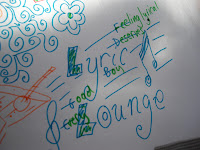| Bricks or cobbles? At any rate, tres urban. |
I am determined to get this post in before 2012; it may be the only constructive piece of writing I've achieved over the Christmas break. Also, it seems rather fitting to close the year with a summing up of the last installment of readings at The Flying Goose in Beeston, arranged by the Nottingham Poetry Series and Nottingham Trent University. December 13th was Salt Modern Voices night, a new series described by the publishers as: 'a brand new series from Salt which aims to deliver short works to new readerships....experiments or side-projects which have a distinctive literary merit...issued like an EP prior to the development of a full-length collection and aimed at breaking new talent and building reception for the writer.' Which sounds very understandable to me. I love the idea of pamphlet being like an EP, I always thought of them in a similar way. Individual poems in magazines are like singles; pamphlets EPs and the collection is the album. My pop upbringing has clearly affected my perception of poetry publishing then. It's also a very savvy project and the web page I lifted this quotation from reads more like a manifesto rather than an introduction to the Salt Modern Voices Series. You can read it here:
It's been two years since I decided to get serious about poetry and it was two years ago I started buying pamphlets, primarily over collections, simply because they felt more accessible and you could buy a few at a time and read works by different authors; then you'd buy the 'album.' Nine Arches have published some very attractive and desirable pamphlets for instance, The Sopranos by Roz Goddard and The Night of the Day by David Morley. I should also mention the work of Smith/Doorstop (click!)at this juncture who produce remarkable poetry pamphlets too and have done for a very long time. I am currently reading The Sea and the Forest, by Sally Baker, lovely.
The Salt project seems rather ambitious due to the amount being published in a relatively short space of time, but that seems to be a Salt trait, something to do with capturing zeitgeist, I suspect. Beeston's Flying Goose cafe was one of the many venues up and down the country showcasing this new series. Four readers: Emily Hasler, Shaun Belcher, JT Welsch and Adrian Slatcher, as well as a single poem at the end by Tim Cockburn as well. Very different in subject matter, but I felt that a similar cadence seemed to resonate through some of the readings, so there was almost an incantatory tone to the evening and bound the readings together rather effectively. Welsch took us to the movies, which was rather exciting for a chilly December night in Nottinghamshire. Belcher's poetry seemed reflective and sonorous; Slatcher's were lyrical and seemed to focus on smaller details in the context of a global experience. It was great to hear Emily Hasler again who read from her pamphlet Natural Histories.
Hasler's opening poem was 'The Cormorants':
You scan the bay and always see one -
plumped like a discarded coat on some
purposeful post of sea-bleached wood.
Hasler has also appeared in Salt's The Best British Poetry 2011, with a poem called 'Valediction', a very memorable love poem which finishes:
The weekend laid out - a mahogany table - I know
where it is; I know where you are. When it rains
the earth smells like it's been there for years.
I always enjoy Emily's readings and have been lucky to catch her twice this year, Natural Histories is a very readable and enticing publication. There was also a chance for us non-Salty beings to read a poem of our own, so Deborah Tyler-Bennett and Roy Marshall had a go amongst others. I lowered the tone with a poem based on teaching Larkin, called 'Larkin' oddly enough.
The drive home was equally memorable for different reasons, lost on the A52 with three poets in a car, headed for some far-flung corner of Derbyshire and not Leicestershire,where we actually live, with 'The Organist Entertains' on Radio 2. Yikes.












